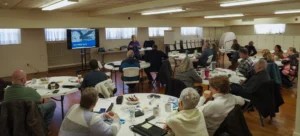Did you play “Hide and Seek” with your neighborhood friends growing up? The version I played involved the “Seeker” standing by a Home Base, usually a tree or street sign, and counting to a designated number (usually 100) while all the “Hiders” dispersed throughout the neighborhood. After the Seeker reached the end of their count, they wandered around the premises attempting to locate the Hiders. If one was located, they both raced back to Home Base. The Hider had to beat the Seeker to Home Base to be “safe.” The game continued until every Hider ended up at Home Base. We played it for hours at a time!
The world in which your near-adult or young adult teenager lives is not all that different from the game “Hide and Seek.” As they travel through their ever-expanding world, challenges, troubles and threats always seem to be seeking them out. Just like the children playing the classic game, your teen, too, needs a Home Base. They need a place to find help, advice and a shoulder to lean on. In short, they need you!
Parents sometimes think that their “tour of duty” as a parent ends when their children graduate from high school or celebrate their eighteenth birthday. I’ve even heard parents say that their child is “finally off the payroll.” That mindset is terribly misguided! As a former educator and high school principal, I’m of the opinion that the period immediately following high school graduation is a most critical time. Expecting a teenager to navigate the critical life choices they will encounter then without the support and wisdom of a parent is a big ask.
So, how do you go about being that supportive parent? Well, it takes some work and some understanding on your part. Your newly minted adult child does have the final word on the decisions they make. You can no longer force them to do the thing you want or think best just because “I said so.” You can reason with them, share your personal experiences and fears with them with the goal to have them make the best decisions, but they will do what they will do. And that is as it should be—it is their life to live.

LEARN MORE: E383-August 2020 Overview
If your parenting was characterized by developing trust and honest communication, your child will know the motives behind your advice are genuine and made out of love. They will also know that, should they decide on a different course of action, your love and support is still there for them. They know that you are their Home Base. They know that they won’t hear you say, “I told you so!” — even if you secretly feel that way.
Probably the two biggest decisions facing a young adult are what to do about college and what to do for a career. As a parent, your life experience can be invaluable in helping your child make their best decision on those issues. Have discussions with your teenager about what they want their career path to be.
Help them discover their aptitudes and explore their interests. Make sure your teen takes the ASVAB career aptitude test in high school. Developed by the U.S. armed services, the test helps individuals learn the types of vocations they are best suited for, given their skills. The test is free and is a very reliable indicator of vocational aptitude.
Take your teenager to visit several colleges and universities that they are interested in.
Find out what the college experience is like there. Research the areas of study for which the school is highly regarded. Find out what percentage of the school’s graduates enter the profession of their major. Determine what financial aid and scholarships are available.
After you complete a tour, sit down with your teenager and help them weigh the pros and cons of the schools you visited. Support them in the college decision they make. If possible, help them financially with the cost. You’ll see why shortly. Help keep them on task completing all the steps necessary to get enrolled.
It is critical to monitor your child’s progress when they begin college life. College is very different from their high school experience. There is much less structure, and professors are not likely to expend extra effort to help a floundering student. The responsibility to seek help is on the student.
Research shows that almost 25% of all first semester freshman college students fail out of college. Only about 60% of all students who enroll in college complete their degree within six years of beginning college. In other words, almost half of all college students don’t have a degree after six years. As a parent, you must help keep your young adult moving ahead.
If you can help them with the cost of college, you become a partner with them in the endeavor. A silent partner for sure—but a partner nonetheless. As such, your student should be responsible for showing you their grades. There’s accountability on their part. Also, because you are helping to finance the education, you can help them avoid aimless drifting. As one parent I know once told their college student: “No major, no money.”
If your young adult believes they would rather enter the world of work instead of college, help them develop a plan to enter a career path, not just find a job. Let them know that it is okay to have a dream—but you have to have a plan! Help them make connections with professionals in their fields of interest.
If you can stay engaged with your young adult, listen to them, offer caring, constructive advice, and not issue demands or rebukes, you can help them successfully make that leap into adulthood. You really can be their Home Base!





